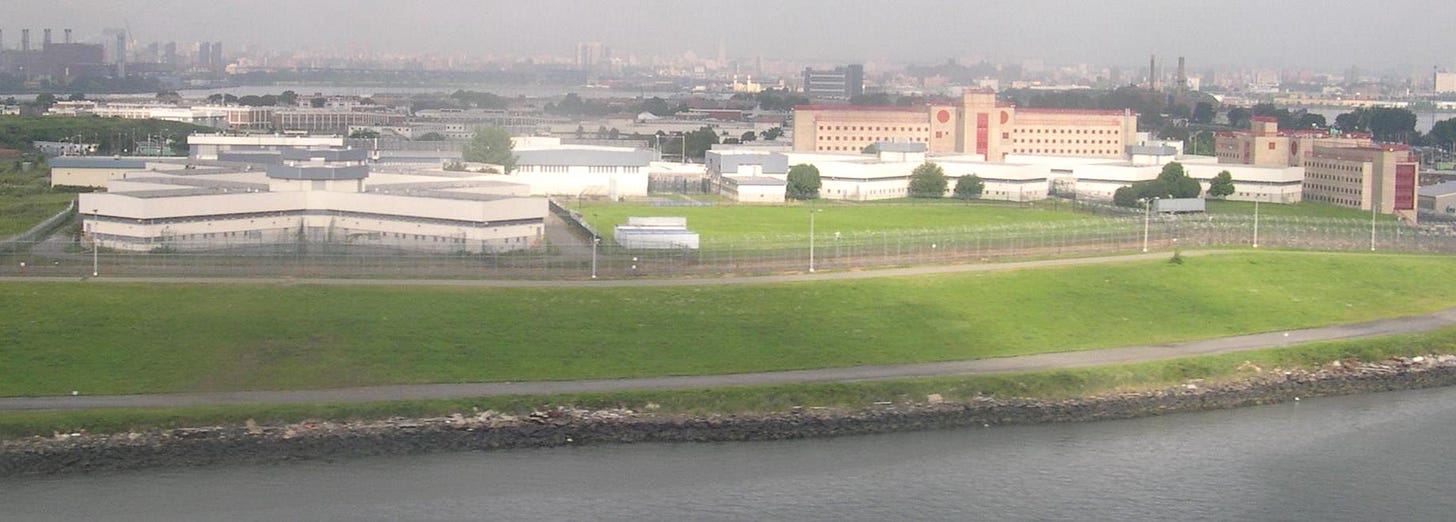Why I Think Trump Will Do Hard Time
New York state officials tried 20 years ago to spare a crooked pol a Rikers sentence. It didn't end well.
Rikers Island.
Will former President Donald Trump go to jail? I think there’s a decent chance he will. Part of my reasoning concerns Guy J. Vellela.
Vellela, who died in 2011, was a Republican politician from the Bronx, which he represented for 28 years in the New York state legislature—the first ten as an assemblyman and the next 18 as state senator. In 2004 Vellela got caught taking bribes. He’d received at least $137,000 (probably more) to secure state bridge-painting contracts for a Bronx firm. Vellela copped a plea, resigned from the Senate, gave up his law license, and was handed a one-year sentence. In New York State, if you receive a sentence of one year or less you don’t go to prison; you go to jail. Which jail depends on where the crime was committed. Vellela committed his crime in New York City, where the jail you go to is Rikers Island. Rikers is nobody’s idea of a country club; its nickname is “Torture Island.” Nearly 100 years old, Rikers is due to be closed as soon as some new city prisons are completed. Really, it ought to be closed now. But we send prisoners to the jails we have, not the jails we wish we had. Vellela checked into Rikers on June 21, 2004. Three months later, he got sprung.
Vellela was released by a mayoral panel called the Local Conditional Release Commission. As the name suggests, this panel, created in 1989, has the power to release, conditionally, people who are jailed in the Great State of New York. The commission exercises this power very sparingly: Between 1999 and 2004, of the thousands of prisoners jailed by the state, only 15 were granted conditional release.
Vellela applied for conditional release almost immediately on arriving at Rikers. On the first go-round, the commission said fuhgeddaboudit. But (according to a subsequent state government report) Vellela kept placing phone calls from Rikers to commission director Eileen Sullivan. In these calls, according to the report, Vellela “sounded highly distraught, often crying very hard, and … said that he missed his family and was very unhappy with prison.” The commission relented, and released Vellela.
That a former government official convicted on charges of public corruption should be granted a very rare conditional release because he didn’t find imprisonment congenial did not play well in the local press. Villela’s preferential treatment created a political uproar, prompting then-Mayor Michael Bloomberg to fire everyone on the panel, including two commissioners Bloomberg had appointed himself. After a new panel was assembled, it reversed the decision, sending Vellela back to Rikers. He checked back in on December 27, 2004, and served the remaining nine months of his sentence.
I relate Villela’s story at length because it’s easy to forget that the decision about whether to sentence Trump to jail will not be made at the national level. It will be made by a New York State official who is probably aware that the last time the state handed a crooked pol a get-out-of-Rikers-free card it didn’t go down very well. If it’s not okay to grant early release to a state senator merely because he’s “very unhappy with prison,” how can it possibly be okay to spare jail time for a former president of the United States who claims the entire process was illegitimate?
Of course, the foregoing assumes Trump merits a jail sentence. I believe that he does. I explain why in my latest New Republic piece. You can read it here.





Noah, I disagree with you for the first time about Trump ever going into a jail cell unless it’s to visit one of his former employees. He should go to jail, but I honestly don’t believe he will. That he should go to jail, yes, I totally agree with you on that.
Great piece, Tim. Impressive historical memory. You’ve thrown down the gauntlet. If the state doesn’t impose a jail term, it will have some explaining to do.